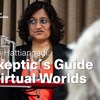skeptic
Charles Manski: Seminar with a skeptic
Charles F. Manski On the 21st and 22nd of January this year Charles F Manski was in Stockholm, invited by the Institute for Futures studies to hold three lectures on his newly published book Public Poli.

Anandi Hattiangadi: A Skeptic's Guide to Virtual Worlds - A response to David Chalmers
Are virtual worlds "real"? Or are they merely "virtual"? In a recent book by David Chalmers, "Reality + - Virtual Worlds and the Problems of Philosophy", he argues that if we in fact were already livi
Erez Maggor: Bidenomics, Industrial Policy, and the Twenty-First Century American Developmental State
Venue: Holländargatan 13, Stockholm Research seminar with Erez Maggor, Assistant Professor at Ben-Gurion University. He studies the political economy of industrial policy and innovation. Register here &
Replies to “Can Consumption-Based Emissions Accounting Solve the Problem of Historical Emissions? Some Skeptical Remarks”
Ethics, Policy & Environment vol 25, no 3, 371–374 Introduction In ´Consumption-Baed Emissions Accounting and Historical Emissions´(Torpman, 2022), I argued that a move from production-based emissio
How politically biased are you? New test on political biases
To what extent do you allow your political views influence your perception of reality? Do you trust facts regardless of whether they support your opinions or not? We may believe that we are impartial,
Disagreement, Indirect Defeat, and Higher-Order Evidence
in Klenk, M. (ed.), Higher Order Evidence and Moral Epistemology, London: Routledge, 2020. (ISBN: 0367343207) AbstractSome philosophers question whether higher-order evidence can support the radical sk
Public Policy in an Uncertain World
Kurs om att tolka forskningsresultat med professor Charles F. Manski. Den 21–22 januari kommer Charles F. Manski att ge en kurs som omfattar tre föreläsningar. Under kursen kommer Manski att visa varfö
Debunking and Disagreement
Noûs, (Early View), DOI: 10.1111/nous.12135. Introduction A familiar way of supporting skeptical doubts about the beliefs in some area, such as ethics orreligion, is to provide a “debunking argument” agaiway is to appeal to the disagreement that occurs in the area.2 These types of challenge areoften treated separately and there is not much overlap in the literature they have given rise to.Yet, as they pursue the same conclusion—that the target beliefs are not (fully) justified andthat we should reduce our confidence in them—one might well wonder how they are related.Are they entirely independent or do they interact in non-trivial and interesting ways? That isthe question I shall explore.
Jens Rydgren
I am Professor of Sociology at Stockholm University. My main areas of research are political sociology and ethnic relations. At Stockholm University I am currently directing a research projects where
Is risk aversion irrational? Examining the “fallacy” of large numbers
Synthese, doi.org/10.1007/s11229-018-01929-5 Abstract A moderately risk averse person may turn down a 50/50 gamble that either results in her winning $200 or losing $100. Such behaviour seems rational i








